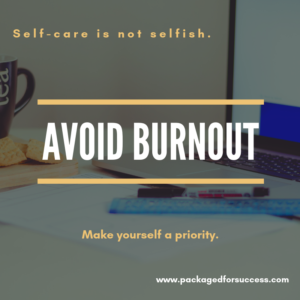5 Ways To Avoid Burnout At Work
Ashley Stahl, Forbes Contributor
Everything’s going great at work. You’re operating on all cylinders, moving quickly. You’re saying yes to everything, taking on all the projects, and it seems like nothing can stop you.
Until one day, it hits you like a ton of bricks. Exhaustion and stress prevail, and you’re completely fried. You are officially burned out.
What is burnout?
You know that state of constant stress, where it feels like no matter what you do, you can’t break out of the slump? Yeah, that’s burnout. Some telltale signs are physical and emotional fatigue, detachment, insomnia, lack of focus, and negative feelings like anger or cynicism. If you’re burned out, job performance will suffer, your personality will shift, and you’ll be too exhausted to function.
Burnout is an epidemic in our culture. In fact, one in five highly engaged employees is at risk for burnout.
But it doesn’t have to be this way.
You can catch burnout before it happens, even if you’re a chronic overachiever! Here are five ways you can avoid getting burned out at work.
1. Sleep!
Insomnia is one of the symptoms of burnout, and when you don’t sleep, your brain doesn’t function at its prime. Getting too little sleep also has other serious consequences, including lack of judgment, increased likelihood of car accidents, and development of chronic diseases like cancer, hypertension, diabetes, and depression.
Getting enough sleep is crucial to your health and happiness, so don’t skimp on it, or let your work cut into those precious hours! Science has proven that adults need 7-9 hours of sleep nightly to function optimally.
2. Exercise.
It may seem counterintuitive to leave work in order to work out, but exercise is crucial to your mental and physical health. Regular exercise reduces levels of stress, improves self-confidence, prevents cognitive decline, increases productivity, and improves memory. The satisfaction of knowing you’re taking care of yourself, and the improved energy you’ll get from getting up and moving rather than sitting stationary at a desk all day, will help prevent that physical and emotional exhaustion that causes burnout.
3. Laugh.
Don’t worry; be happy! It’s been proven that laughing relieves stress and has many positive short-term and long-term effects. Actually, every study conducted on laughter has produced positive results. And it’s hard to be cynical and angry when you’re laughing so hard your sides hurt. So interact more with the funny guy at the office. Plan a catch-up date with your funniest friend. Go see a comedy. Literally laugh the stress away!
4. Socialize.
Spending time with people outside of work gives you some much-needed emotional fulfillment. Only socializing at work, and making work your entire life, will leave you burned out and emotionally detached from those people you would normally hang out with on your days off. Try scheduling regular social activities, whether it’s Sunday brunch or a weekly movie night, to keep you engaged and active.
5. Start saying no!
I used to be a total ‘yes’ girl. I’d take on every project, speak at conferences every week, and travel the country in order to gain new clients. The problem was, the more I took on, the more it began to wear on me.
It can be easy to say yes to everything, especially if you have that go-getter mentality. Trust me, I know. But it’s important to say no to some things in your career if you’re going to stay engaged, excited, and energetic about your work. Choose what’s most important to you (or most necessary to your work), and stick to only those events or projects.
Burnout is stressful, harmful, and a huge hindrance on your work and personal life. But you don’t have to get to that point! Just be careful to pay attention to where you’re at emotionally, as burnout can creep up on you. Check in with yourself every once in a while to make sure you’re treating yourself kindly, and not overloading your schedule or your stress levels.
Article originally appeared on Forbes.
Related:
